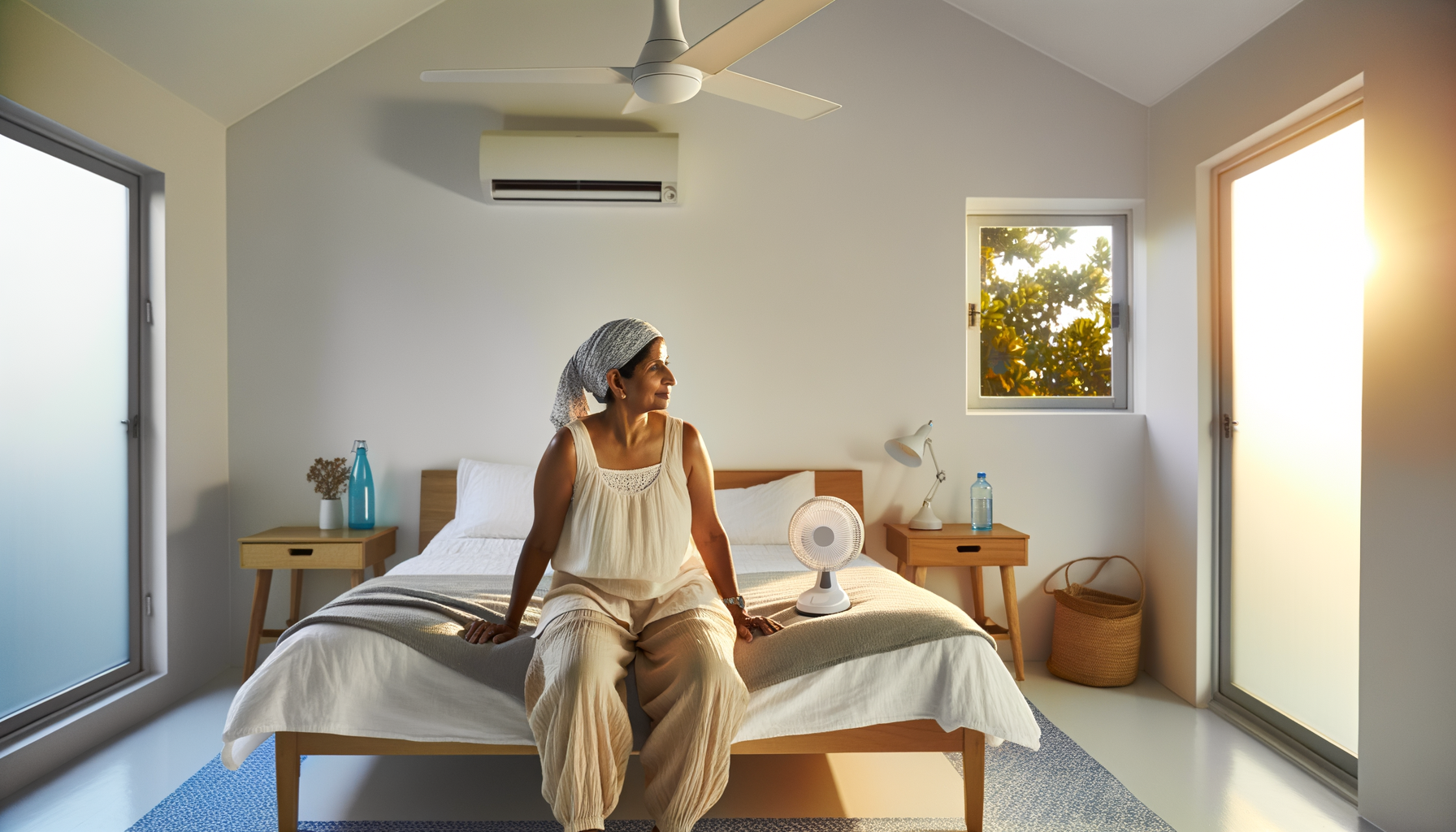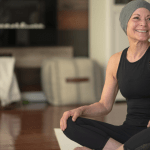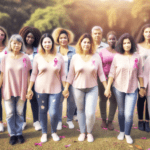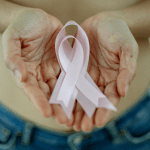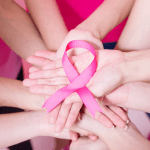Hot Flashes in Breast Cancer Survivors
Each year, over 200,000 women are diagnosed with breast cancer, a condition that not only poses a significant health threat but also brings about a myriad of challenges during and after treatment. One of the most common and distressing symptoms experienced by breast cancer survivors is hot flashes, which can significantly impact quality of life and daily functioning. Hot flashes are reported to be more prevalent and severe in breast cancer survivors compared to the general population, often exacerbated by treatments such as chemotherapy, hormone therapy, and ovarian suppression.
Induced Menopause from Cancer Treatments
Cancer treatments, including chemotherapy, surgical removal of the ovaries, antiestrogen therapy, and radiotherapy, can induce menopause in women who are not yet menopausal. This “induced menopause” can lead to intense menopausal symptoms such as hot flashes, sleep disturbances, and urinary tract problems. The severity of these symptoms can range from mild to severe, posing additional challenges for survivors as they navigate their post-treatment lives.
Challenges of Managing Menopausal Symptoms
Managing menopausal symptoms in breast cancer survivors is particularly challenging due to the estrogen sensitivity of most breast cancers. Systemic hormone therapy, which could alleviate menopausal symptoms in the general population, is often not an option for survivors. This limitation necessitates the exploration of nonhormonal and lifestyle alternatives to provide relief from hot flashes and other menopausal symptoms.
Estrogen Sensitivity and Treatment Limitations
The majority of breast cancers are sensitive to the hormone estrogen, which fuels their growth. Consequently, systemic hormone therapy is contraindicated, leaving survivors with fewer treatment options. Nonhormonal medications, lifestyle modifications, and relaxation techniques are often recommended to manage symptoms. It is crucial for healthcare providers to offer effective alternatives to hormone therapy to improve the quality of life for breast cancer survivors experiencing menopausal symptoms.
Lifestyle Modifications for Hot Flash Management
Identifying and Avoiding Triggers
One of the first steps in managing hot flashes for breast cancer survivors is to identify and avoid potential triggers. Common triggers include stress, alcohol, caffeine, spicy foods, and environmental factors such as hot weather or overheated rooms. Keeping a diary to track hot flashes and associated activities can help pinpoint specific triggers. Once identified, survivors can take proactive steps to adjust their lifestyle, such as reducing caffeine intake or avoiding hot showers, to help minimize the occurrence of hot flashes.
Regulating Core Body Temperature
Regulating core body temperature is crucial in managing hot flashes. Simple strategies include dressing in layers, using fans, and staying hydrated with cool water. At night, breathable cotton sheets and sleepwear can help, as well as keeping a cool pack under the pillow. Air conditioning or a ceiling fan can also provide relief, especially during warmer months or in hot climates.
Importance of Maintaining a Healthy Weight
Research has shown that a higher body mass index (BMI) can be a predictor of more frequent hot flashes. Excess body fat, particularly during peri- and postmenopause, is associated with an increased frequency of hot flashes. Therefore, maintaining a healthy weight through a balanced diet and regular physical activity is an important aspect of managing menopausal symptoms.
The Role of Smoking Cessation
Smoking has been linked to an increased risk of hot flashes. Both current and past smokers may experience more frequent and severe hot flashes compared to non-smokers. Quitting smoking can not only reduce hot flashes but also improve overall health and decrease the risk of developing other health conditions.
Benefits of Regular Exercise
Regular exercise is beneficial for overall health and can also help manage hot flashes. Physical activity can lead to fewer hot flashes and may reduce their intensity. However, it’s important to note that strenuous exercise might trigger hot flashes in some women by raising core body temperature. Therefore, finding a balanced and sustainable exercise routine is key.
In conclusion, lifestyle modifications play a significant role in managing hot flashes for breast cancer survivors. By identifying triggers, regulating body temperature, maintaining a healthy weight, quitting smoking, and engaging in regular exercise, survivors can alleviate the discomfort associated with hot flashes and improve their quality of life during menopause.
Stress Management and Relaxation Techniques
Link Between Anxiety and Hot Flashes
For many breast cancer survivors, the experience of hot flashes is not just a physical symptom; it is intricately linked with psychological stress, particularly anxiety. Research indicates that anxiety can exacerbate the frequency, severity, and perception of hot flashes. The body’s natural “fight or flight” response, triggered by stress, can lead to the activation of the sympathetic nervous system, which in turn may contribute to the onset of hot flashes. Managing stress is therefore not only important for overall well-being but can also be a key strategy in reducing the occurrence and impact of hot flashes.
Yoga and Meditation for Symptom Relief
Yoga and meditation are holistic approaches that have been shown to provide relief from menopausal symptoms, including hot flashes. These practices promote relaxation, reduce stress, and enhance quality of life. Yoga, with its gentle physical postures and breath control, can help regulate the body’s temperature and reduce the intensity of hot flashes. Meditation, particularly mindfulness-based stress reduction (MBSR), encourages a focus on the present moment, helping survivors to manage stress and anxiety more effectively. Both yoga and meditation can be adapted to individual needs and abilities, making them accessible to most breast cancer survivors.
Breathing Exercises and Paced Respiration
Breathing exercises, especially paced respiration, have been identified as beneficial techniques for managing hot flashes. Paced respiration involves slow, deep, abdominal breathing, which can help calm the sympathetic nervous system and mitigate the body’s stress response. By practicing paced respiration regularly, survivors can gain a sense of control over their hot flashes, reducing their intensity and frequency. This non-pharmacological approach is simple, can be practiced anywhere, and has no adverse side effects, making it an excellent tool for stress and symptom management.
In conclusion, stress management and relaxation techniques such as yoga, meditation, and paced respiration offer valuable nonhormonal options for breast cancer survivors seeking relief from hot flashes. By incorporating these practices into their daily routines, survivors can improve their quality of life and gain a greater sense of well-being during their menopausal journey.

Bette 100% All-Natural Relaxing Lavender Body Lotion.
Chemical-Free
Your relaxing night time body moisturizer to leave the day’s stress behind. Decompress and wish your body good night with the calming scent of lavender.
Nonhormonal Medications for Hot Flash Relief
Blood Pressure Medications
For breast cancer survivors experiencing hot flashes, nonhormonal options are essential due to the estrogen sensitivity of most breast cancers. Blood pressure medications, particularly clonidine, have been identified as an effective alternative. Clonidine works by modifying the body’s vascular response, helping to manage the quick release of heat that leads to hot flashes. It is available in both oral and transdermal forms, offering flexibility in administration. While not as potent as hormone therapy, clonidine has been shown to reduce the frequency and severity of hot flashes, making it a viable option for those seeking nonhormonal treatments.
Antidepressants as a Treatment Option
Another class of nonhormonal medications that has shown promise in treating hot flashes are antidepressants, specifically Selective Serotonin Reuptake Inhibitors (SSRIs). Drugs such as paroxetine, fluoxetine, and venlafaxine have been used with varying degrees of success. These medications are thought to work by affecting serotonin, a neurotransmitter that plays a role in regulating body temperature. It is important to note that some SSRIs can interact with tamoxifen, a common medication used in breast cancer treatment, potentially reducing its effectiveness. Therefore, careful selection and consultation with a healthcare provider are crucial when considering SSRIs for hot flash relief.
Antiseizure Drugs for Managing Symptoms
Gabapentin, an antiseizure medication, has also been found to be beneficial in managing hot flashes. Its effectiveness is thought to be related to its influence on the nervous system and its ability to stabilize electrical activity in the brain, which may be linked to the regulation of body temperature. Gabapentin is typically well-tolerated, and its use in hot flash management provides an additional nonhormonal option for breast cancer survivors who are unable to use hormone therapy.
In conclusion, while hormone therapy has been the traditional go-to for managing menopausal symptoms such as hot flashes, its use is contraindicated in breast cancer survivors due to the risk of cancer recurrence. Fortunately, nonhormonal medications like blood pressure drugs, antidepressants, and antiseizure medications offer alternative pathways for relief. Each of these options has its own mechanism of action and potential side effects, and therefore, the choice of treatment should be personalized and made in consultation with a healthcare provider.
Emerging Therapies and Future Research
Innovations in Nonhormonal Treatments
As the search for safe and effective treatments for hot flashes in breast cancer survivors continues, innovations in nonhormonal therapies are showing promise. These treatments range from lifestyle interventions to pharmaceuticals that do not influence hormone levels. For instance, selective serotonin reuptake inhibitors (SSRIs) and serotonin-norepinephrine reuptake inhibitors (SNRIs) have been found to reduce the frequency and severity of hot flashes. Additionally, gabapentin, an anticonvulsant, and clonidine, a hypertension medication, have shown efficacy in managing hot flashes. The use of cognitive behavioral therapy (CBT) and hypnosis are also emerging as effective nonhormonal strategies to alleviate symptoms.
Ongoing Studies and Clinical Trials
Current research efforts are focused on understanding the underlying mechanisms of hot flashes and identifying new treatment targets. Ongoing clinical trials are exploring a variety of nonhormonal medications, including newer antidepressants, anticonvulsants, and other agents that may affect the thermoregulatory pathways. Additionally, studies are investigating the role of complementary therapies such as acupuncture, yoga, and dietary modifications in managing menopausal symptoms. The National Institutes of Health and other research bodies are funding these trials, emphasizing the need for evidence-based interventions for menopause relief in breast cancer survivors.
Anticipated Developments in Menopause Management
Looking ahead, we anticipate significant developments in the management of menopause symptoms, particularly hot flashes, in breast cancer survivors. Personalized medicine approaches that tailor treatments based on individual genetic, hormonal, and lifestyle factors are expected to improve outcomes. Moreover, advancements in wearable technology may lead to the development of real-time symptom tracking devices that can monitor and predict hot flashes, allowing for preemptive management strategies. As our understanding of the neuroendocrine pathways involved in hot flashes deepens, new pharmacological targets are likely to emerge, leading to the development of novel therapeutics with fewer side effects.
In conclusion, the landscape of menopause management for breast cancer survivors is evolving rapidly. With ongoing research and clinical trials, the future holds promise for innovative treatments that offer relief from hot flashes without compromising the health and well-being of survivors.

Additional Menopausal Challenges for Survivors
Vaginal Dryness and Painful Intercourse
For many breast cancer survivors, the onset of menopause—whether natural or induced by treatment—brings about a host of additional challenges beyond hot flashes. Vaginal dryness is a common and distressing symptom that can lead to discomfort and pain during intercourse, known as dyspareunia. The lack of estrogen, which maintains the health and elasticity of vaginal tissues, often results in thinning and inflammation, causing significant discomfort and a decrease in sexual function and quality of life.
Nonhormonal lubricants and moisturizers are often recommended as first-line treatments to alleviate vaginal dryness. Regular sexual activity, with or without penetration, can also help maintain vaginal health by improving blood flow. For those who find these measures insufficient, low-dose vaginal estrogen therapies may be considered, although they should be used with caution and under the guidance of a healthcare provider due to the potential risks associated with hormone use in breast cancer survivors.
Increased Risk of Osteoporosis
Another concern for menopausal breast cancer survivors is the increased risk of osteoporosis. The decline in estrogen levels can lead to a decrease in bone density, making bones more fragile and susceptible to fractures. Survivors who have undergone chemotherapy or hormonal treatments such as aromatase inhibitors are at an even higher risk, as these treatments can accelerate bone density loss.
To combat this, survivors are encouraged to engage in weight-bearing and muscle-strengthening exercises, which can help maintain bone density. Adequate intake of calcium and vitamin D is also crucial. In some cases, medications such as bisphosphonates or denosumab may be prescribed to protect bone health, but these decisions must be carefully weighed against potential side effects and the individual’s overall health profile.
Sleep Disturbances and Quality of Life
Sleep disturbances are a frequently reported issue among menopausal breast cancer survivors. Hot flashes can disrupt sleep, leading to insomnia and fatigue, which in turn can affect mood, cognitive function, and overall quality of life. Establishing good sleep hygiene is essential; this includes maintaining a cool and comfortable sleeping environment, adhering to a regular sleep schedule, and avoiding stimulants before bedtime.
For those who struggle with sleep despite these measures, cognitive-behavioral therapy for insomnia (CBT-I) may be an effective nonpharmacological approach. In some cases, healthcare providers may consider prescribing sleep aids, but these should be used with caution due to the risk of dependency and other side effects.
Overall, addressing these additional menopausal challenges requires a multifaceted approach that includes lifestyle modifications, nonhormonal therapies, and, when necessary, pharmacological interventions, all tailored to the individual needs and health history of the breast cancer survivor.

Popular Read
Resources and Support for Breast Cancer Survivors
Educational Materials and Support Groups
For breast cancer survivors experiencing menopausal symptoms such as hot flashes, access to accurate information and peer support can be invaluable. Educational materials can provide insights into the nature of hot flashes, their connection to breast cancer treatments, and the range of management strategies available. These resources often include tips on lifestyle modifications, nonhormonal medical treatments, and coping mechanisms for managing symptoms effectively.
Support groups, whether in-person or online, offer a platform for survivors to share experiences, offer mutual support, and exchange practical advice. These groups can help alleviate feelings of isolation and empower survivors with knowledge and emotional support. Organizations such as the American Cancer Society and local hospitals often provide listings of support groups specifically tailored for breast cancer survivors.
Navigating Healthcare and Treatment Options
Understanding and navigating the healthcare system can be challenging for breast cancer survivors seeking relief from menopausal symptoms. It is crucial for survivors to have clear guidance on how to access specialized care, including consultations with oncologists, gynecologists, and menopause specialists who are knowledgeable about the unique needs of breast cancer survivors.
Healthcare providers can assist in evaluating the risks and benefits of various treatment options, taking into account the survivor’s medical history, current health status, and personal preferences. Survivors should be encouraged to engage in shared decision-making with their healthcare team to determine the most appropriate management plan for their menopausal symptoms.
Advocacy and Awareness Initiatives
Advocacy groups play a critical role in raising awareness about the challenges faced by breast cancer survivors, including the management of menopausal symptoms. These organizations work to influence policy, improve access to care, and fund research into more effective treatments. By participating in advocacy efforts, survivors can help shape the conversation around breast cancer survivorship and ensure that their voices are heard.
Initiatives such as awareness campaigns and educational seminars can also help to disseminate information about menopause relief options and encourage more research into this important area. Survivors can contribute to these initiatives by sharing their stories, volunteering, or participating in events that aim to educate the public and healthcare professionals about the menopausal challenges faced by breast cancer survivors.
